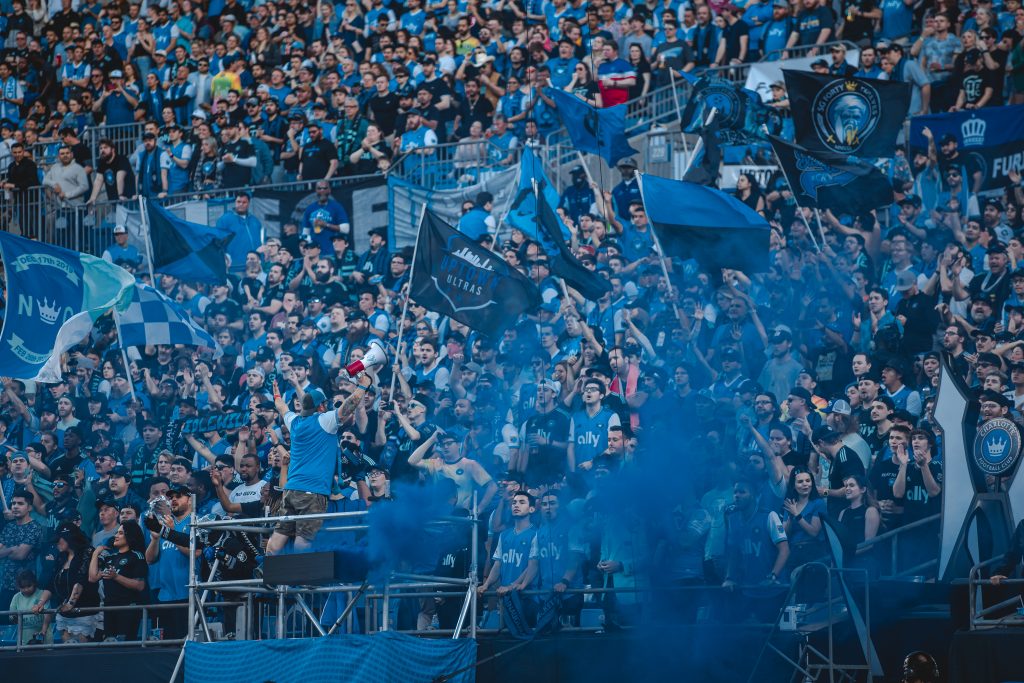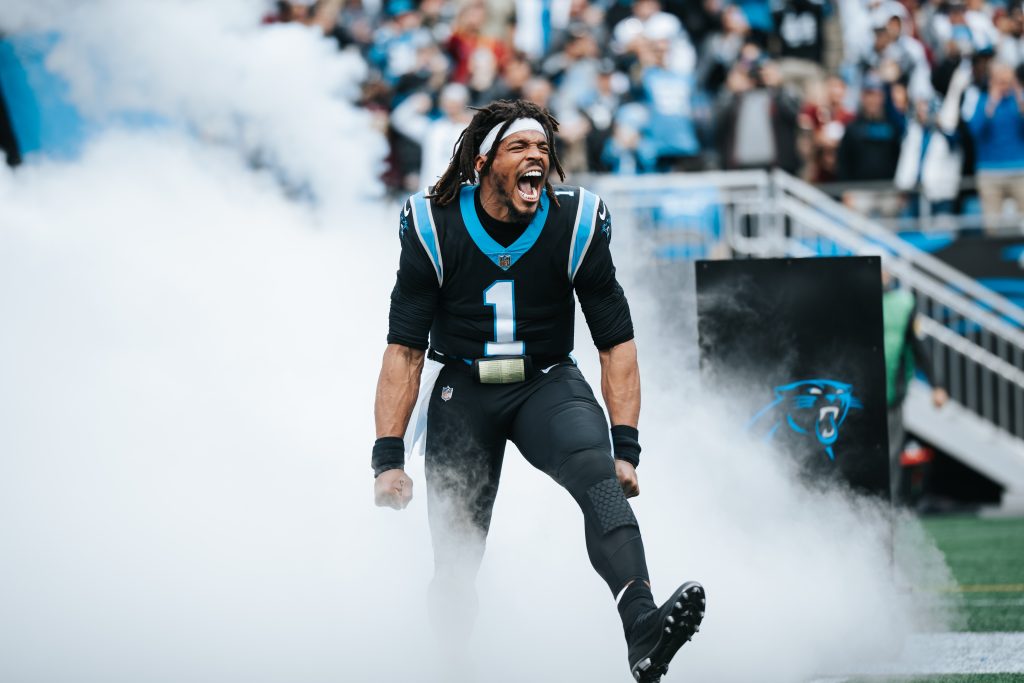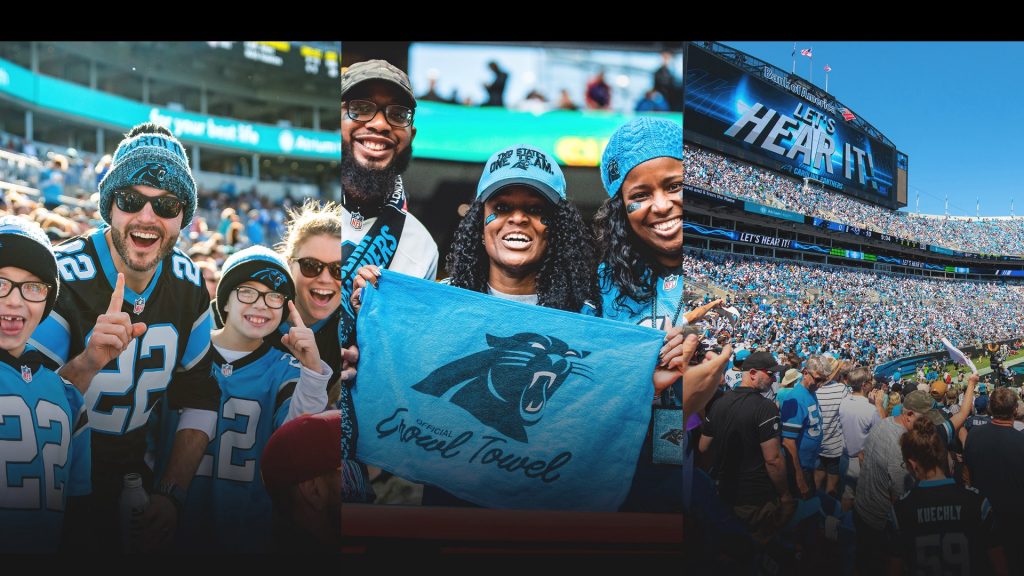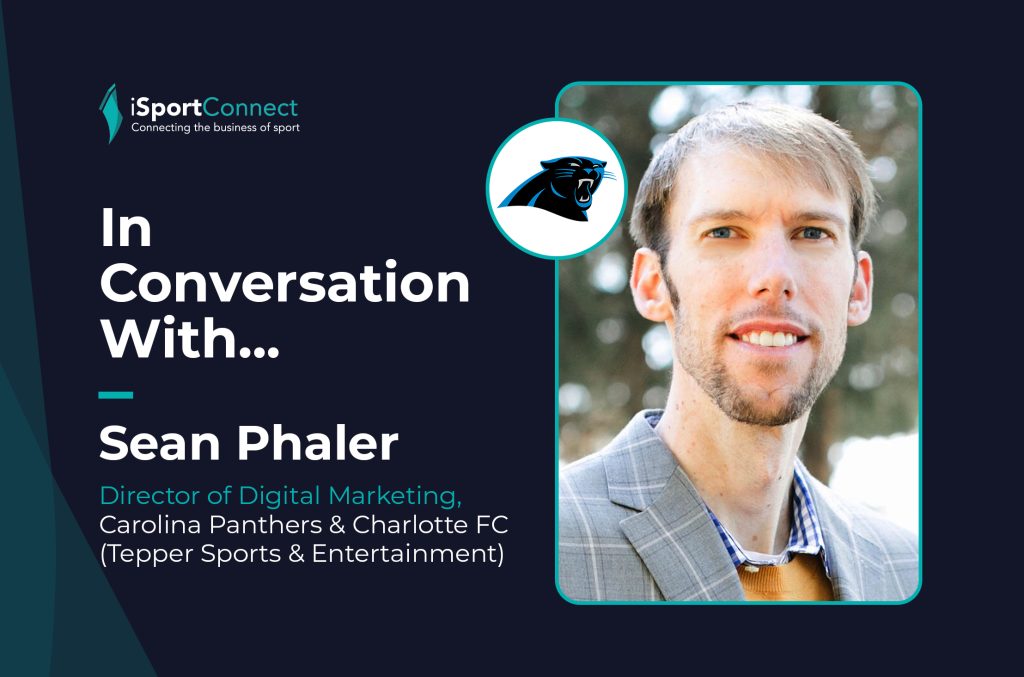“If We Apply All The Stuff The Corporate World Is Using In The Sports World It’s Just Going To Unlock More Revenue Streams”
March 23, 2022
Ben Page talks to Sean Phaler, Director of Digital Marketing at Tepper Sports & Entertainment, ahead of his appearance at iSportConnect’s Digital & Data Masterclass on Tuesday, March 29th in London.
In the past couple of years the Carolina Panthers have been undergoing a transformation since new owner David Tepper came into the franchise, looking to create a strong culture across the organisation.
Tepper Sports & Entertainment currently own the Panthers, the all-new MLS franchise Charlotte FC, and the home stadium of both teams, Bank of America Stadium in North Carolina.
Charlotte FC recently had a highly successful launch to their life in MLS, drawing a record crowd of 74,479 in the stadium for their debut fixture against LA Galaxy. One person who has been working across both franchises since joining the organisation two years ago is Sean Phaler, Director of Digital Marketing for the group.

Sean entered the organisation with a great deal of familiarity, as a Panthers fan himself. A high-level basketball player, Sean’s career has spawned from his personal passion outside of the sporting arena, as a self-confessed computer nerd growing up to now being employed by Tepper Sports & Entertainment.
“Early on I was fascinated with computers and this world of web design. From winning a web design contest for a $60,000 / year job when I was 14. Throughout high school, I built dozens of websites including a custom ecommerce site selling car parts. I knew basketball was a way to go to college and I ended up getting a scholarship to play basketball,” Sean says. “Being realistic about my future I decided to get a business degree and focus my studies to further my business career. In my senior year of college, my friend’s dad needed a website, which spawned into making a few sites for people. By the time I graduated I had a web design company already up and running.”
So once you left University what were your steps, did you pursue basketball at all?
I played professionally briefly but I realised I could make decent money owning my own web design business, instead of following the path a lot of my teammates took by continuing playing overseas. A few years into my career, the NBA’s Charlotte Bobcats had a job opening which meant I could combine both my passions – digital and basketball.
I took bobcats.com from a news website posting game recaps, videos, and photos to creating interactive experiences and building out a group of microsites along the way. At that time, NBA teams were a lot more progressive, as the Bobcats were one the first NBA teams to launch an app at the time. Right as the Bobcats became the Hornets, I left the sports world and joined the corporate world with the same athlete/sport hard-working mentality.
“I went into my new corporate gig and said ‘I want to post something cool on social’, the response I got was ‘Great. How much money is that going to bring in?'”
That’s when I transformed my professional career because at that time so many people in the sports digital world didn’t understand revenue implications in the business world. I went into my new corporate gig and said ‘I want to post something cool on social’, the response I got was ‘Great. How much money is that going to bring in?’
In the first year I hit a lot of roadblocks from executives and had to fight against things like, how do I make money for the company but also still do these progressive digital marketing campaigns? How does this social post add revenue to the company? How do I show the ROI on my performance and the effectiveness of marketing campaigns?
I suppose you had to fight that battle by explaining this is going to change our perception and be a benefit in the long run?
I did. And at that point the term digital marketing wasn’t nearly as broad. I was able to change a lot of high-level corporate executives’ minds by introducing A/B testing, Conversion Rate Optimisation. Through expansion in e-commerce, implementation of marketing automation with high revenue growth, evolution in social media, significant advancement in SEO & PPC, proven data-driven results, and noteworthy photo and video I work helped advance their digital transformation. You must explain it to them in a way where you say ‘Look, I know you’re the head executive and you want this thing to be green, but I can use data to back me up that it should be red based on what the data is telling me.’

After my success at Pentair, I landed at Ingersoll Rand where I led two Global Center of Excellence Programs (COEs) in digital marketing and demand generation for a $16B organisation. Also, during that time I was part of the enterprise marketing team to spinoff and brand an all-new pure play climate company – Trane Technologies.
What have you been trying to implement and change within the Panthers over the last couple of years?
There has been so much change in the sports marketing world over the last few years. Investing in the right people, process and technology can make a huge difference in marketing’s effectiveness to give marketers the ability to become a revenue driver for the company instead of the cost-center they have always been known to be.
“I think that the word digital marketing gets a little confused.”
Within digital marketing we are trying to build a data driven and digitally led marketing function backed by a revenue generating engine. Where every campaign, event, project, etc. must have a direct connection to drive revenue or support a revenue generating initiative. We want to utilise advanced marketing analytics to understand performance and campaign effectiveness. Lastly, we want to collaborate closely with our sales team to understand what drives ticket and partner performance & revenue.
How difficult was it coming into that initial situation right as Covid started and having to deal with that uncertainty?
It was tough across the industry. There was no warning, budgets were cut. That meant strong business cases had to be made. Thankfully we were able to introduce traditional digital marketing techniques that we were confident would drive incremental revenue for the company.

When you look at the big picture, do you think that that’s the way that digital marketing has been changing by becoming more involved and blending into those partnership conversations, rather than just being on ticket sales, etc.?
I think that the word digital marketing gets a little confused. Because even within the NFL you have a director of digital marketing and his sole focus is what is posted on social. We have a social team, but my main focus is driving revenue. So there’s a clear difference in what the term digital marketing is. As a digital marketing professional we have to do a better job explaining externally and internally how we define digital marketing, and what that means for us.
You’re looking at building out the team more. What are the specific focuses you want people coming into the business to have because, as you say, there are many different specific areas?
That’s the part where I’m having a hard time finding people. Because the days of saying I know how to run social, in today’s digital world that’s like the Microsoft Word of 20 years ago. Anyone involved in digital has some type of social media experience or knows how to post on ‘X’ platform.
“We know if we apply all the stuff that the corporate world is using in the sports world it’s just going to unlock more revenue streams and more learnings for growth.”
You need to have that knowledge and past experience, but I’m trying to hire people that are more revenue centred as well. My digital marketing field has four strategic pillars:
- Performance Marketing – We will use data-led marketing innovation investments to drive further uplift in marketing generated revenue through all paid advertising channels.
- Digital experiences – We will continue to optimise and enhance all websites/apps while looking to build out new digital experiences for all Tepper Sports and Entertainment properties.
- Marketing automation – We will revolutionise the fan email experience through personalised end-to-end customer journeys based on digital behaviour data, while implementing first-class marketing technology.
- Digital insights – Working at the intersection of marketing and data to understand marketing campaign analytics to drive greater revenue and optimization.
Personalisation is coming into everything so much currently, how much has that been changing from even your time with the Bobcats around a decade ago to now with the Panthers?
We want to understand how we connect all our data to drive more one-to-one marketing.
I want to know that when John Smith walked into the stadium, he bought a hot dog and a beer, so that next time he walks in I can send a message letting him know he can get 50% off a hotdog if he buys a beer. That’s all based on buying behaviour and habits, we’re not there yet but we will be soon.

How can we unlock certain data and marketing technology tools that are being used in the corporate world and apply them to sports? We know if we apply all the stuff that the corporate world is using in the sports world it’s just going to unlock more revenue streams and more learnings for growth. In the corporate world they must invest in the people/process/technology to survive, whereas in the sports world we know we have engaged fans and we are profitable, so sometimes it might seem like we don’t need to heavily invest. The smart teams are investing and will be able to have such a great understanding on who their fans / customers are.
What would you say are the biggest changes that have kind of happened since your time with the Bobcats to then coming back in with the Panthers and Charlotte FC?
For me it’s the amount of marketing technology, I think the number of digital vendors that allow us to do marketing really well. The data lakes, the CDP’s, applying that learning into knowing what the fan is going to do and serving them X number of ads definitely didn’t happen 5-10 years ago.
“We’re always going to be learning and churning out and cleaning data to understand what that looks like.”
Now we have the ability and we’re building it, but we’re always going to be learning and churning out and cleaning data to understand what that looks like. This true one to one marketing personalisation is really going to come to light for some teams, but honestly some others aren’t ready to invest in that.
What would you say are the biggest lessons you’ve learned throughout your career?
The biggest advice is to always say yes. I don’t have a digital marketing degree. I do have a marketing degree, but there was no digital marketing when I went to college. The one thing is don’t be scared to fail, just try everything once and then as soon as you try it, you’ll learn from it.
Not every campaign I’ve run has been successful, my successes far outweigh my losses, but I’ve had my fair share of losses. However, from those losses I’ve learned so much that I’m able to make myself better.
I’d add to this that staying abreast of what’s happening with emerging technology is important. There’s no true expert in this space. I know some people have tried to claim to be an expert, no one’s an expert. We’re all learning as we go. Try to adapt and absorb as much as you can to apply to what you’re doing today.


